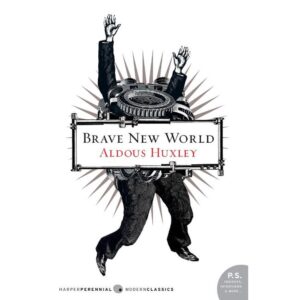Two novels written decades ago have shaped the genre of dystopias–grim tales of the near future. From these have come The Hunger Games, the Divergent series, The Handmaid’s Tale, The Matrix, even Pixar’s WALL-E, and many more. What are the two landmark books?
 George Orwell’s 1984 (published in 1949) imagines a future dictatorship in which Big Brother knows everything that everyone does and thinks. Aldous Huxley’s Brave New World (published in 1932) imagines a highly technological society in which humans are genetically bred, indoctrinated, and drugged into passive obedience.
George Orwell’s 1984 (published in 1949) imagines a future dictatorship in which Big Brother knows everything that everyone does and thinks. Aldous Huxley’s Brave New World (published in 1932) imagines a highly technological society in which humans are genetically bred, indoctrinated, and drugged into passive obedience.
I’ve been rereading Neil Postman’s classic Amusing Ourselves to Death, published in 1985, and was once again struck by his opening comparison of these two. He writes:
Contrary to common belief even among the educated, Huxley and Orwell did not prophesy the same thing. Orwell warns that we will be overcome by an externally imposed oppression. But in Huxley’s vision, no Big Brother is required to deprive people of their autonomy, maturity and history. As he saw it, people will come to love their oppression, to adore the technologies that undo their capacities to think.
What Orwell feared were those who would ban books. What Huxley feared was that there would be no reason to ban a book, or there would be no one who wanted to read one.
Orwell feared those who would deprive us of information. Huxley feared those who would give us so much that we would be reduced to passivity and egoism.
Orwell feared that the truth would be concealed from us. Huxley feared the truth would be drowned in a sea of irrelevance.
Orwell feared we would become a captive culture. Huxley feared we would become a trivial culture, preoccupied with some equivalent of the feelies, the orgy porgy, and the centrifugal bumblepuppy.
As Huxley remarked in Brave New World Revisited, the civil libertarians and rationalists who are ever on the alert to oppose tyranny “failed to take into account man’s almost infinite appetite for distraction.” In 1984, Huxley added, people are controlled by inflicting pain. In Brave New World, they are controlled by inflicting pleasure.
In short Orwell feared that what we hate will ruin us. Huxley feared that what we love will ruin us.
This book is about the possibility that Huxley, not Orwell, was right.
What do you think? Was Postman right? Is our world closer to Brave New World than to 1984?


wow, great synthesis and contrast of these two classic worldviews. I would think, from the argument you laid out, not from a recent read of either book, that the pleasure principle is taking over. D
Yes, I think in general you are right: we are dominated much more by pleasure than government control. And if there is a Big Brother who knows all and sees all we do, it is not the government but Google, Facebook, and Amazon (who seek to manipulate us with pleasure in order to make money).
Your post reminded me of an interview I once heard on Christian radio. A missionary was a guest on a show and talked talked about how he felt God was asking him to go to North Korea.
“Wow, North Korea. That’s a very dangerous place.” said the host.
“Before I was called there, I was headed to a much more dangerous place,” said the missionary.
“What could be more dangerous than North Korea?” asked the host perplexed.
After a short pause, the missionary replied, “I was headed for the couch.”
The lesson of this interview has stayed with me … always reminding me of the luring dangers of our comfort.